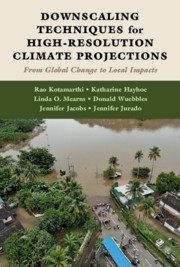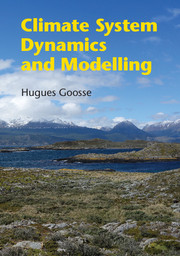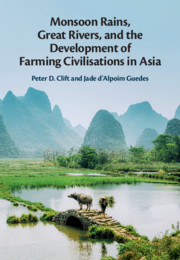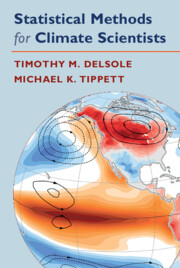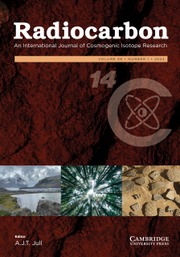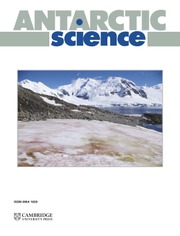Statistical Downscaling and Bias Correction for Climate Research
- Authors:
- Douglas Maraun, Karl-Franzens-Universität Graz, Austria
- Martin Widmann, University of Birmingham
- Date Published: January 2018
- availability: This ISBN is for an eBook version which is distributed on our behalf by a third party.
- format: Adobe eBook Reader
- isbn: 9781108340649
Find out more about Cambridge eBooks
Adobe eBook Reader
Other available formats:
Hardback
Looking for an inspection copy?
This title is not currently available on inspection
-
Statistical downscaling and bias correction are becoming standard tools in climate impact studies. This book provides a comprehensive reference to widely-used approaches, and additionally covers the relevant user context and technical background, as well as a synthesis and guidelines for practitioners. It presents the main approaches including statistical downscaling, bias correction and weather generators, along with their underlying assumptions, skill and limitations. Relevant background information on user needs and observational and climate model uncertainties is complemented by concise introductions to the most important concepts in statistical and dynamical modelling. A substantial part is dedicated to the evaluation of regional climate projections and their value in different user contexts. Detailed guidelines for the application of downscaling and the use of downscaled information in practice complete the volume. Its modular approach makes the book accessible for developers and practitioners, graduate students and experienced researchers, as well as impact modellers and decision makers.
Read more- Includes a list of useful online resources such as data sets and software packages to assist in practical applications
- Provides practical guidelines on choosing downscaling and bias correction methods to enable best-practise in real applications
- The presentation makes the material easily accessible to different audiences, highlighting issues of relevance to downscalers, impact modellers, climate service providers and decision makers
Awards
- Winner, 2019 PROSE Award for Environmental Science
Reviews & endorsements
'This book provides an invaluable reference for anyone involved in developing or using local and regional projections to quantify climate change impacts. As climate model output becomes increasingly accessible and open source code for downscaling is shared by the research community, the selection of methods and data to use for a local climate impacts analysis becomes more complex. This reference provides comprehensive guidance for those developing improved downscaling approaches, applying existing methods, or using data generated by others. The authors keep a clear focus on quantifying the uncertainties involved in each step of a downscaling process, and highlighting opportunities to ultimately produce more skilful information for decision-makers challenged with responding to climate change impacts.' Ed Maurer, Santa Clara University, California
See more reviews'A large variety of statistical downscaling and bias correction methods are used for connecting climate change with impact assessments. The new book by D. Maraun and M. Widmann provides a very useful overview of the methods and topics involved and gives guidance for future users. The demand for downscaled information is rapidly growing and this book helps with understanding assets and drawbacks.' Daniela Jacob, Climate Service Center Germany (GERICS), Hamburg
Customer reviews
Not yet reviewed
Be the first to review
Review was not posted due to profanity
×Product details
- Date Published: January 2018
- format: Adobe eBook Reader
- isbn: 9781108340649
- contains: 81 b/w illus. 6 tables
- availability: This ISBN is for an eBook version which is distributed on our behalf by a third party.
Table of Contents
Preface
Acknowledgements
1. Introduction
Part I. Background and Fundamentals:
2. Regional climate
3. History of downscaling
4. Rationale of downscaling
5. User needs
6. Mathematical and statistical methods
7. Reference observations
8. Climate modelling
9. Uncertainties
Part II. Statistical Downscaling Concepts and Methods:
10. Structure of statistical downscaling methods
11. Perfect prognosis
12. Model output statistics
13. Weather generators
14. Other approaches
Part III. Downscaling in Practice and Outlook:
15. Evaluation
16. Performance of statistical downscaling
17. A regional modelling debate
18. Use of downscaling in practice
19. Outlook
Appendix A. Methods used in this book
Appendix B. Useful resources
References
Index.
Sorry, this resource is locked
Please register or sign in to request access. If you are having problems accessing these resources please email [email protected]
Register Sign in» Proceed
You are now leaving the Cambridge University Press website. Your eBook purchase and download will be completed by our partner www.ebooks.com. Please see the permission section of the www.ebooks.com catalogue page for details of the print & copy limits on our eBooks.
Continue ×Are you sure you want to delete your account?
This cannot be undone.
Thank you for your feedback which will help us improve our service.
If you requested a response, we will make sure to get back to you shortly.
×

